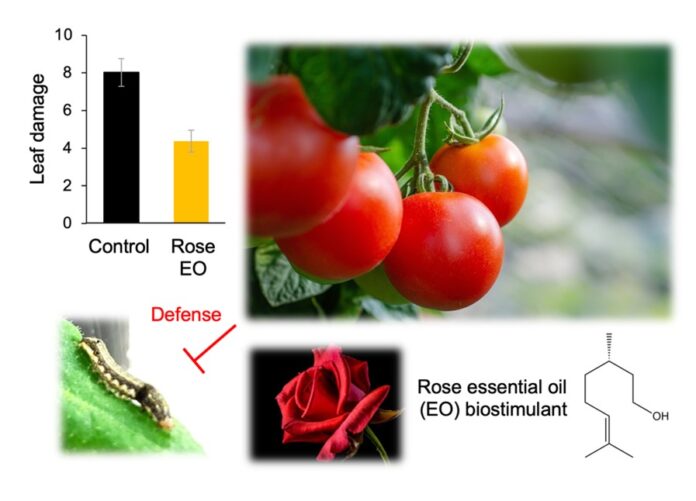
Researchers have found rose essential oil could be a safe pesticide for organic agriculture, as it activates defence genes in the tomato plant.
Plants release terpenoids to enhance their defences after an injury. Researchers at the Tokyo University of Science studying terpenoid-enriched essential oils (EOs) have found that rose EO (REO) can stimulate defence genes in tomato leaves. Furthermore, REO attracts herbivores that protect the plant from the moth species Spodoptera litura, and Tetranychus urticae, a mite pest. These findings suggest that application of REO could be a sustainable approach to pest management in organic farming.
Terpenoids are abundant in plant EOs, which have been found to illicit insect-repellent responses in a process known as “eavesdropping”. For example, soybean and komatsuna plants, when grown near mint, experience a significant improvement in defense properties and become resistant to herbivores, as the mint plant releases volatile compounds that trigger the activation of defence genes and protect against herbivore threats.
There is an urgent need for investigation of plant defence potentiators to create safer alternatives to the predominantly used chemical pesticides that cause damage to the environment and ecosystems. The availability of EOs makes them an attractive choice for environmentally friendly pesticides, however there is currently a sufficient lack of proven examples to meet the demand.
To address this, a research team led by Professor Gen-ichiro Arimura from the Department of Biological Science and Technology at the Tokyo University of Science (TUS) assessed the efficacy of 11 EOs in activating tomato defense responses. “EOs used as fragrances for various purposes contain odor components, which may have the ability to work like volatile compounds in conferring pest resistance. We aimed to investigate the effects of these EOs on plants’ insect pest resistance,” says Prof. Arimura. The team’s findings were published in the Journal of Agricultural and Food Chemistry on March 18, 2024.
The team profiled the effects of terpenoid-enriched EOs on tomato plants. They applied ethanol-diluted solutions of 11 different EOs to the soil of potted tomato plants, performed molecular analyses to study the gene expression inside leaf tissue, and observed that rose EO (REO) increased the transcript levels of PIR1 and PIN2, the genes involved in plant defense. Additionally, tomato plants treated with REO exhibited reduced leaf damage caused by the Spodoptera litura (a moth species) larvae and Tetranychus urticae (a mite pest). Furthermore, to explore the possibility of broader application, the researchers conducted a field experiment to measure REO activity in field conditions. They observed a 45.5% reduction in tomato pest damage compared to the control solution. The researchers believe that REO could serve as a viable alternative to pesticides during the winter and spring seasons when pest infestation is less severe and could potentially reduce pesticide usage by almost 50% during summers.
Explaining the research findings, Prof. Arimura says, “REO is rich in β-citronellol, a recognized insect repellent, which enhances REO’s efficacy. Owing to this, damage caused by the moth larvae and mites was significantly minimized, confirming REO as an effective biostimulant. The findings also showed that a low concentration of REO did not repel T. urticae but attracted Phytoseiulus persimilis, a predator of these spider mites, thus exhibiting a dual function of REO.”
Overall, the study highlights the role of β-citronellol-enriched EO in activating defense genes in tomato leaves. Additionally, it provides evidence that REO is an effective biostimulant for enhancing plant defense against pests, which is also safe as it does not lead to phytotoxicity or leave any toxic residues behind. “Our study suggests a practical approach to promoting organic tomato production that encourages environmentally friendly and sustainable practices. This research may open doors for new organic farming systems. The dawn of potent environmentally friendly and natural pesticides is upon us,” concludes Prof. Arimura.










